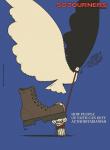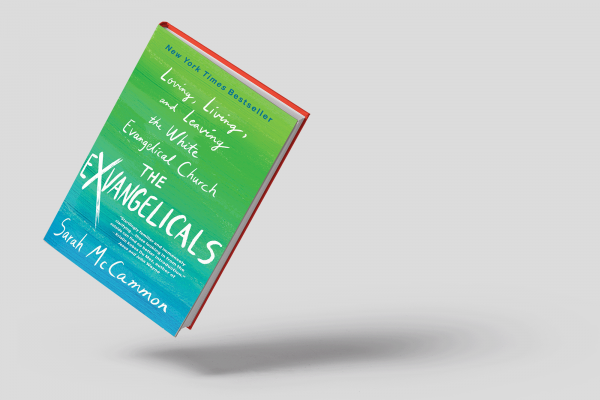CHRISTIANITY IN THE U.S. often resembles a politically charged, dysfunctional family tree, its branches twisting and tangling as factions clash. When evangelical Christians leave their branch — or the entire tree — some continue to wrestle with the ideas that shaped their lives. NPR political correspondent Sarah McCammon portrays those wrestlers with care in The Exvangelicals: Loving, Living, and Leaving the White Evangelical Church.
“Exvangelical” and “deconstruction” are buzzwords in some corners of Christian internet. The former was coined by Exvangelical podcast host Blake Chastain; McCammon defines the latter as “the often painful process of rethinking an entire worldview and identity that was carefully constructed” within conservative faith traditions.
McCammon uses a hybrid of journalism and memoir to show how conservative evangelical Christianity colored her life and the lives of her interviewees in damaging ways. One woman’s parents tricked her into thinking the end times had arrived and she’d been left behind, a relatable “rapture” experience for McCammon. “The sound of a train whistle, or a loud car horn, was enough to send me into a panic, that maybe this was it,” she writes.
That anxiety doesn’t always disappear when a person’s theology changes. Exvangelicals might lose a support system and ready “answers” to questions “about the purpose of life, human origins, and what happens after death,” McCammon explains. Crucially, she interviews mental health professionals on the complexities of treating religious trauma.
McCammon’s chapter on evangelical ties to white supremacy is grounded in insights from Rev. Tyler Burns and public historian Jemar Tisby, leaders of #LeaveLOUD, a movement in which Black Christians tell their stories of exiting white evangelicalism. Theological grappling transcends race and ethnicity, but “exvangelicalism” tends to center white voices. “There’s a sense in which we were never evangelical because of race, so the [exvangelical] hashtag and movement is a very white one,” Tisby explains.
Many evangelical groups have been quiet about racism but painfully loud about sexuality, sex, and gender roles. McCammon interviews writer Jeff Chu, who has maintained relationships with family members who don’t accept LGBTQ+ identities. During Chu’s seminary graduation, his parents did not interact with his husband. “I’m angry and sad for the kids that are still in evangelical churches who are being told they can’t be themselves,” Chu explains. “But I’m not bitter towards those evangelicals who have deep convictions and are trying to do the best they know how.”
McCammon reflects on how her relationship to scripture has evolved, specifically with John 15, which begins: “I am the true vine, and my Father is the gardener. He cuts off every branch in me that bears no fruit, while every branch that does bear fruit he prunes so that it will be even more fruitful.”
“I was taught to believe that people like me — the spiritually withered — are the unfruitful branches that Jesus warned about, who deserve to be cut off,” she writes. “Maybe such pruning is intended for ideas like the ones taught in our church sanctuaries and homeschool classrooms — ideas that close off inquiry and confine us to narrow ways of seeing the world.”
McCammon’s book is a compassionate companion to life after evangelicalism. The author bears good fruit.

Got something to say about what you're reading? We value your feedback!







